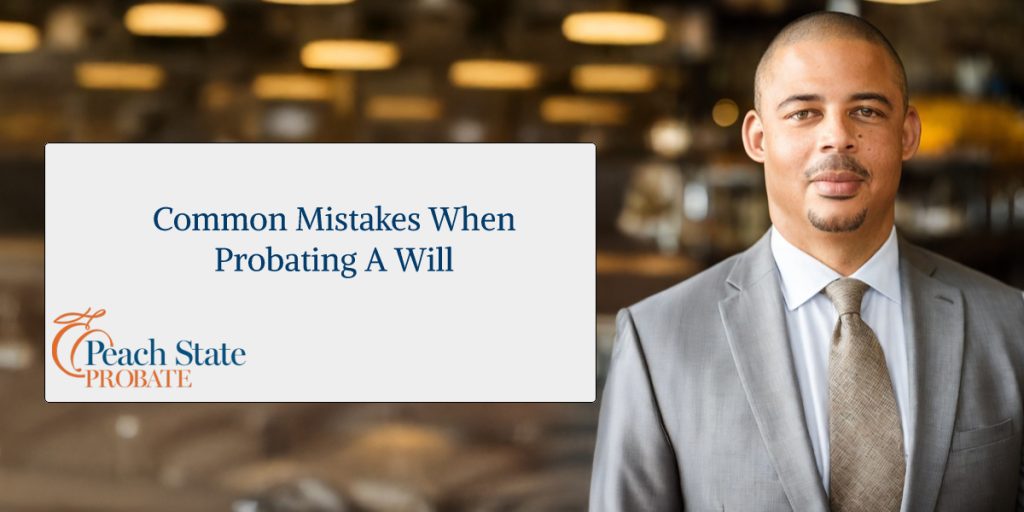## Common Mistakes During the Process of Probating a Will
Probating a will is a critical legal procedure that validates a testator’s last wishes and facilitates the orderly distribution of their assets. However, many individuals making this journey for the first time often stumble into pitfalls that can complicate the process. Navigating the complexities of this legal matter allows for emotional and financial clarity but requires a solid understanding of common errors that arise during this time. Understanding how to avoid these missteps helps ensure that the wishes outlined in the will are honored efficiently.
Probating a will involves several steps that need to be adhered to meticulously, including submitting the will to probate court, compiling an inventory of the deceased’s assets, and addressing any outstanding debts. Unfortunately, failure to recognize and rectify common mistakes can result in prolonged court procedures, disputes among heirs, and even financial losses. With proper guidance and foresight, individuals can circumvent these frequent issues and adhere closely to the law, fostering a smoother transition during what can be a trying time.
A significant aspect of avoiding mistakes in the probate process is being proactive and informed about the legality involved. Engaging with professionals familiar with Georgia’s probate laws is paramount for those who wish to streamline this procedure. Knowledge, combined with attention to detail, can reduce the emotional burden on family members during an already challenging period.
## Understanding the Process of Probating a Will
Probating a will is essentially the process of bringing a deceased person’s will before the probate court to validate it as the true last testament. This legal journey typically begins organically once the descendants or executors have determined that the deceased individual left behind a valid will. If no will exists, this process can become more complex, leading to potential disputes about asset distribution according to state laws.
Upon initiation, the executor must file the will with the local probate court along with additional documents, such as the death certificate. After filing, the court will issue a document known as “Letters Testamentary” that grants the executor authority to act on behalf of the deceased’s estate. This includes managing finances, settling debts, and eventual asset distribution to beneficiaries. The timeline for probating a will can vary depending on asset complexity, estate size, and state laws, all crucial factors in determining how long the process will take.
While probating a will might seem straightforward, potential complications, such as contested wills and differing beneficiary claims, often arise, requiring attention to detail and a thorough understanding of legal nuances. Having a properly structured will can facilitate a smoother probate process, but misinformed actions can lead to unnecessary delays and conflict among heirs.
## Importance of Understanding Common Mistakes in Probating a Will
Recognizing common mistakes when probating a will is essential for anyone tasked with overseeing the estate of a deceased loved one. Being aware of these missteps can not only help the executor but also protect the interests of all beneficiaries involved. Issues often arise from miscommunication, lack of awareness about the laws, and, sometimes, emotional turmoil during an already challenging time.
Mistakes can inject considerable delays into the probate process, which can compound emotional strife for families. For example, failing to notify all beneficiaries, neglecting to properly maintain estate assets, or mishandling tax obligations can create friction amongst heirs and may legally prevent a smooth transition of affairs. Understanding these risks and how to avoid them is essential for efficient estate management and for fulfilling the decedent’s last wishes.
Moreover, legal disputes can emerge due to improper handling of the probate process, leading to expensive litigation and prolonged stress. By proactively identifying and managing avoidable errors, an executor can ensure that the probate process proceeds as smoothly as possible, allowing family members to focus on what truly matters during this transitional time.
## Legal Framework for Probating a Will in Georgia
The legal framework governing the probate process in Georgia is designed to provide a clear pathway for the distribution of assets and resolution of debts. It is crucial for executors and beneficiaries to familiarize themselves with these regulations, as they set the foundation for how a will is probated and enforced. Georgia’s probate laws outline the responsibilities of executors, the rights of heirs, and the necessary steps for legally validating a will.
The primary statutes relevant to probating a will in Georgia can be found in the Official Code of Georgia Annotated (O.C.G.A.) Title 53, which covers wills, estate administration, and even disputes that may arise during the process. Notably, in Georgia, there are two distinct types of probate proceedings: “testate,” which involves a valid will, and “intestate,” which pertains to cases where no valid will exists. Understanding which type applies to a specific situation is crucial for determining the steps that need to be followed.
Additionally, navigating through the requirements such as filing deadlines, notice to beneficiaries, and tax obligations necessitates a familiarity with legal paperwork and processes established by the court. Incorrect or incomplete filings can result in delays and even the dismissal of the probate petition, underscoring the importance of comprehensive knowledge of the legal framework surrounding probating a will.
## Real-Life Scenarios Involving Probating a Will
Examining real-world examples of probating a will offers valuable insights into common mistakes and potential consequences. For instance, consider an executor who fails to notify all the heirs about the probate proceedings. This oversight can lead to legal challenges from discontent beneficiaries who may feel excluded or mistreated, subsequently prolonging the probate process.
Another scenario involves an executor mismanaging estate assets. For example, if the executor ignores the need for maintaining real estate property, the estate may begin losing value due to neglect, creating resentment among heirs. Ensuring that all assets are appropriately maintained and managed not only protects their value but also upholds the executor’s fiduciary duty to act in the estate’s best interests.
Lastly, issues related to tax obligations can create significant turmoil in the probate process. Failing to consider inheritance tax or the decedent’s outstanding debts can lead to complications down the line, as beneficiaries may find themselves liable for expenses they had not anticipated. Understanding the financial implications of probating a will is essential for effective estate management and for fulfilling the testator’s intentions without unexpected financial burdens on heirs.
## Key Steps for Efficiently Navigating the Probate Process
Navigating the probate process can be streamlined by adhering to well-defined steps that avoid potential pitfalls. The initial phase involves carefully reviewing the will and gathering important documentation, such as the death certificate and property titles. Understanding the deceased’s wishes is paramount and ensures that the process remains transparent and compliant with legal requirements.
Once the relevant documents are compiled, the executor can file the will with the probate court, effectively initiating the probate process. It is vital to be organized and precise during this step, as any mistakes in paperwork could result in delays or rejections from the court. Notifying all beneficiaries and potential heirs promptly is also crucial, as it helps prevent disputes later on.
After the will has been accepted for probate, the executor is responsible for valuing the estate’s assets, settling any outstanding debts, and preparing the estate for distribution. Keeping meticulous records and documenting all transactions related to the estate is essential for accountability, preventing disputes, and ensuring compliance with legal obligations. Engaging in transparent communication with beneficiaries throughout the process can also help in managing expectations and fostering an amicable environment among family members.
## Common Pitfalls to Steer Clear of During Probate
Understanding the common pitfalls when probating a will is essential for executors and beneficiaries alike. One major mistake is delaying the probate process, often due to indecision or an emotional reaction to the loss of a loved one. Promptly initiating probate can protect the estate’s assets from being diminished and speed up asset distribution to beneficiaries.
Another potential misstep involves failing to adhere to the notice requirements dictated by Georgia law. Executors must notify beneficiaries and heirs within a specific timeframe. Neglecting this responsibility can lead to disputes and even invalidate the probate process, prompting dissatisfaction among heirs who feel sidelined.
Moreover, executors should not underestimate the importance of thorough record-keeping. Inadequate documentation of expenses, transactions, and decisions can leave them vulnerable to questioning by beneficiaries, creating an environment ripe for conflict. By proactively avoiding these pitfalls, executors can proceed confidently through the probate process while honoring the decedent’s intent.
## When to Seek Legal Advice for Probating a Will
While probating a will is something individuals may undertake on their own, there are critical junctures where consulting an attorney becomes essential. When complex issues arise, such as disputes between heirs or intricate estate tax implications, obtaining legal guidance can mitigate potential conflict and confusion. An attorney can help facilitate a resolution to disputes or clarify legal obligations, ultimately upholding the integrity of the probating process.
Executors should also consider reaching out for legal advice if the estate includes significant assets, multiple properties, or business interests that require specialized knowledge. The guidance of an attorney can ensure compliance with all necessary laws and procedures, preventing errors that could lead to severe consequences. In these cases, professional intervention not only aids in navigating the probate landscape but also provides peace of mind to the executor and beneficiaries alike.
Lastly, if a will is contested, it is imperative to engage with legal counsel immediately. Legal disputes can be complex and protracted, and having an attorney who understands probate law can significantly enhance the chances of favorably resolving any issues that arise. Legal representation can be the difference in effectively managing challenges that threaten the probating process.
## Advantages of Professional Legal Representation in Probate Situations
Having professional legal representation during the probate process presents numerous advantages. Experienced attorneys understand the intricacies of probate law, including potential pitfalls that laypeople may overlook. By ensuring all procedural requirements are met, they help expedite the process and protect the interests of the estate and its beneficiaries.
Additionally, legal professionals can serve as mediators in situations where conflicts arise among heirs. Their neutral perspective can help facilitate honest discussions, reducing the risk of prolonged litigation or emotional fallout. This protective role may also stave off disputes before they escalate into legal battles, preserving family relationships during an already emotional time.
Finally, when it comes to asset management, attorneys provide invaluable guidance in ensuring that estate assets are preserved while debts are settled appropriately. They can prevent mismanagement of funds, advise on tax implications, and ensure the correct procedures are followed for safeguarding the estate’s value. Having a knowledgeable guide not only eases the burden on executors but also provides beneficiaries with reassurances that the probate process is being handled appropriately.
## How Peach State Probate Assists in the Probate Process
At Peach State Probate, we prioritize clarity and efficiency in assisting clients with probating a will throughout Georgia. Our comprehensive services ensure that we guide each client through the intricate maze of probate law, addressing their unique situations with personalized attention. Clients feel reassured knowing that they have a dedicated team to help manage the complexities associated with this emotional and often overwhelming process.
Our firm’s extensive understanding of Georgia probate laws equips us to navigate challenges effectively. Whether managing asset distribution, handling debt settlements, or representing clients in disputes, our emphasis on communication ensures that our clients’ needs and concerns are always addressed. By allowing us to intervene in the probate process, individuals and families can rest easy knowing that their interests are being fiercely protected.
We recognize that each probate situation is unique, which is why our legal experts take the time to understand the specific needs of every client. This personalized approach means clients can make informed decisions every step of the way, thus streamlining the entire probate process. Peach State Probate stands as a dedicated partner for families as they navigate the complexities associated with honoring their loved ones’ last wishes, making their transition as smooth as possible.




